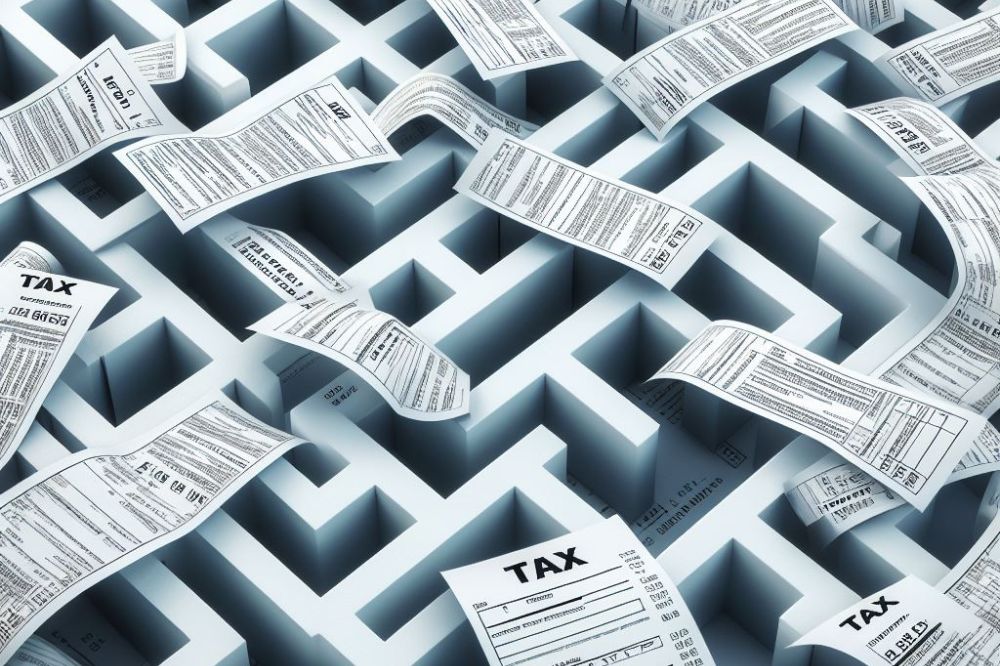Did you know that over 700,000 individuals filed for insolvency, as debtors seeking dischargeable debt relief from creditors in the United States last year? Navigating taxes during such a challenging time can be overwhelming. However, understanding the process is crucial to ensure compliance and financial stability. When filing taxes during bankruptcy, debtors must differentiate between pre-bankruptcy and post-bankruptcy periods to plan money owed to creditors. Ensuring accurate reporting of income, deductions, and credits is vital for a smooth tax filing experience. Seeking professional guidance from a tax advisor or accountant specializing in bankruptcy can provide valuable insights and peace of mind during this complex process.
Key Takeaways
- Stay Informed: Understand the implications of bankruptcy on your tax filings to navigate the process effectively.
- Notify the IRS: Ensure you inform the IRS about your bankruptcy status to avoid any complications in your tax dealings.
- Maximize Refunds: Manage any tax refunds wisely during bankruptcy proceedings to benefit your financial situation.
- Reference Your Case Number: Use your bankruptcy case number when communicating with the IRS to streamline the process.
- Plan Ahead: Consider the impact of bankruptcy on your tax debts and plan accordingly for a smoother financial recovery.
- Utilize Post-Bankruptcy Strategies: Implement post-bankruptcy tax planning strategies to optimize your financial situation and minimize future tax burdens.
Understanding Bankruptcy
Basics Explained
Bankruptcy involves the debtor declaring insolvency to manage overwhelming debts, including tax obligations. It requires an experienced bankruptcy attorney to help the debtor file for bankruptcy and navigate the complex legal processes. Understanding key terms like assets, liabilities, exemptions, and tax periods is crucial for a successful bankruptcy filing. Managing taxes during bankruptcy involves documenting income, deductions, and exemptions accurately.
IRS Involvement
The IRS plays a pivotal role in the bankruptcy process by ensuring compliance with tax laws. Individuals filing for bankruptcy must adhere to specific requirements set by the IRS regarding tax filings. The IRS closely monitors tax payments and refunds during bankruptcy proceedings to prevent any discrepancies.
Bankruptcy Types
Chapter 7 bankruptcy involves liquidating assets to repay debts, while Chapter 13 focuses on creating a repayment plan. Each bankruptcy type has distinct implications for tax filing requirements. Choosing between Chapter 7 and Chapter 13 impacts how tax debts are managed during and after the bankruptcy process.
Impact on Taxes
Bankruptcy can significantly impact tax debts and liabilities, potentially leading to their discharge or repayment through a structured plan. Tax refunds may be used to repay creditors in some cases, affecting the individual’s financial situation post-bankruptcy. Failing to address tax issues during bankruptcy can result in legal consequences and prolonged financial difficulties.
Notifying the IRS
Filing Procedure
Filing taxes during bankruptcy is crucial. Follow a structured approach to ensure compliance with IRS regulations. Understand that timely filing is essential. Ensure all income, deductions, and credits are accurately reported.
When filing taxes during bankruptcy, specific forms are necessary. Complete Form 1040 for individual tax returns or Form 1065 for business entities. Include any additional schedules or forms required by the IRS based on your financial situation.
Special considerations may apply when filing taxes during bankruptcy. Seek guidance from a tax professional to navigate complex tax laws effectively. Understand any exemptions or deductions available to you during this process.

Required Documents
Gather essential documents before initiating the tax filing process. Ensure you have copies of W-2s, 1099s, and other income statements. Keep records of expenses, receipts, and any relevant financial information.
Accurate and complete documentation is critical for tax filing during bankruptcy. Provide detailed records of all financial transactions and activities. Double-check all figures to avoid discrepancies that could lead to issues with the IRS.
Confirmation Process
The confirmation process in bankruptcy proceedings verifies the accuracy of submitted documents. Expect scrutiny from the court-appointed trustee overseeing your case. Prepare to provide explanations or clarifications if requested.
During bankruptcy, tax-related matters undergo confirmation as well. Be prepared to present evidence of compliance with tax laws and regulations. Understand that thorough documentation is key to a smooth confirmation process.
Knowing what to expect during the confirmation process can ease potential stress. Anticipate inquiries about your financial affairs and tax obligations. Stay informed about the progress of your tax filings within the bankruptcy proceedings.
Managing Refunds
Refund Eligibility
Determining eligibility for tax refunds during bankruptcy is crucial. Understanding the criteria impacting refund reception is essential. Exceptions and limitations to refund eligibility should be noted.
Claiming Process
Follow the claiming process for tax deductions and credits while in bankruptcy. Ensure all eligible deductions and credits are claimed to reduce tax liabilities. Comprehend the specific procedures for claiming tax benefits during bankruptcy.
Refund Allocation
Understanding how tax refunds are allocated in bankruptcy cases is vital. Be aware of the priority order for allocating tax refunds among creditors. Familiarize yourself with regulations governing the allocation of tax refunds.
Bankruptcy Case Number
Finding Your Number
Calculating your tax liabilities accurately during bankruptcy is crucial. Discover the methods to determine the exact amount owed to the IRS. Utilize tools or resources available to help you find your tax number efficiently.
Understanding how to calculate your tax obligations ensures compliance with bankruptcy laws. Learn about the importance of accuracy in this process. By knowing your exact tax number, you can manage your finances effectively during bankruptcy.
Importance Explained
Filing taxes correctly during bankruptcy is essential for financial stability. Understand the implications of failing to address tax obligations properly. Failure to comply with tax laws can lead to legal consequences and financial setbacks in many cases.
Recognize the significance of complying with tax laws during bankruptcy proceedings. Failure to do so can result in delays in your case and potential legal issues down the line. By managing your taxes diligently, you can navigate bankruptcy smoothly.
Effect on Tax Filings
Filing Status Changes
Bankruptcy can alter your filing status for tax purposes, impacting how you report your income and deductions. During bankruptcy, your filing status might shift due to changes in financial circumstances. To adapt effectively, stay informed about any alterations in your filing status.
Deductions and Credits
While navigating bankruptcy, explore available deductions and credits to optimize tax benefits. Understanding these tax breaks can help minimize your tax liability during challenging financial times. Look into specific deductions or credits tailored for individuals going through bankruptcy.
Debt Discharge Taxability
In bankruptcy cases, it’s crucial to grasp the taxability of discharged debts to manage potential tax consequences efficiently. Being aware of how discharged debts may affect your taxes enables you to plan accordingly. Handle the tax implications related to discharged debts with care.
Tax Debts in Bankruptcy
Dischargeable Taxes
Debtors should know that certain types of taxes can be discharged in bankruptcy, relieving them of the obligation to repay. Understanding the criteria for discharging tax debts is crucial. The process involves meeting specific conditions set by bankruptcy laws to qualify for discharge. Addressing dischargeable taxes correctly ensures compliance with legal requirements.
When filing for bankruptcy, individuals must meet specific conditions to discharge tax debts. Income taxes are generally dischargeable if they meet specific criteria, such as being due for a certain number of years. Other types of taxes, like property taxes, may also be dischargeable under certain circumstances. The key lies in understanding the rules and regulations surrounding tax debt discharge.
In bankruptcy proceedings, it’s essential to prioritize tax debts effectively. Some tax debts are considered priority claims, taking precedence over other unsecured debts. These priority tax debts must be repaid first before other creditors receive payments. By understanding the hierarchy of repayment in bankruptcy, debtors can ensure compliance with legal requirements and avoid complications.
Priority Tax Debts
Certain tax debts hold priority status in bankruptcy proceedings, meaning they must be addressed before other debts. These may include unpaid payroll taxes or tax liens, which take precedence over general unsecured debts like credit card balances. Debtors need to understand which tax debts fall into this category to comply with bankruptcy regulations.
Understanding the hierarchy of priority tax debts is crucial for debtors navigating bankruptcy proceedings. By recognizing which tax obligations hold priority status, individuals can allocate their resources effectively towards repayment. This prioritization ensures that essential tax debts are settled promptly within the framework of bankruptcy regulations.
Post-Bankruptcy Tax Planning
Future Filings
After bankruptcy, prepare for future tax filings by keeping detailed records of your finances and income. Understand the approach to filing taxes post-bankruptcy to ensure compliance with tax laws. Be aware of any ongoing responsibilities related to future tax filings.
Avoiding Penalties
To avoid tax penalties during bankruptcy, implement strategies such as timely filing and payment. Understand the consequences of penalties for non-compliance with tax regulations. Stay compliant with tax laws and regulations to prevent incurring penalties.
Financial Recovery Tips
Discover tips for financial recovery during and after bankruptcy, including creating a budget and sticking to it. Learn how to rebuild financial stability by focusing on savings and responsible spending habits. Implement effective strategies for managing finances to prevent future tax issues.
Additional Resources
Helpful Guides
Exploring helpful guides is crucial when navigating tax issues during bankruptcy. These resources provide valuable insights and step-by-step instructions on how to manage taxes effectively. By referring to reputable guides, individuals can gain a better understanding of their tax obligations and rights.
Accessing reliable sources of information is essential for researching the complexities of tax filing procedures amidst bankruptcy. These guides offer detailed explanations, examples, and tips to assist individuals in accurately reporting their financial assets. By utilizing these resources, filers can ensure compliance with tax laws and regulations.
Reputable guides serve as a wildcard for individuals seeking guidance on managing taxes in bankruptcy. These resources cover various scenarios, such as handling property and income during the bankruptcy process. By following the advice provided in these guides, filers can make informed decisions that align with their financial goals.

Professional Advice
Seeking professional advice from tax experts or financial advisors is highly recommended for individuals navigating bankruptcy. These professionals possess the knowledge and experience to offer personalized guidance on tax matters. By consulting with experts, filers can receive tailored recommendations based on their unique financial situations.
Understanding the benefits of consulting with professionals during bankruptcy is essential for making well-informed decisions. Tax experts can provide clarity on complex tax issues, exemptions, and deductions available to filers post-bankruptcy. By leveraging their expertise, individuals can optimize their tax strategies and maximize savings.
Learning how professional advice can help you make informed decisions about tax matters empowers individuals to take control of their financial futures. By collaborating with experienced advisors, filers can develop comprehensive tax plans that align with their long-term objectives and priorities.
Online Tools
Utilizing online tools and resources streamlines tax calculations for individuals going through bankruptcy proceedings. These digital platforms offer user-friendly interfaces for inputting financial data and generating accurate tax returns. By leveraging online tools, filers can simplify the complex process of calculating taxes post-bankruptcy.
Accessing digital platforms that offer assistance with tax filing procedures enhances efficiency and accuracy in managing taxes during bankruptcy. These online resources provide templates, calculators, and guidelines to help individuals navigate through various tax requirements seamlessly. By utilizing these tools, filers can save time and reduce errors in their tax filings.
Exploring online tools that streamline the tax management process empowers individuals to take control of their financial responsibilities post-bankruptcy. These tools automate calculations, generate reports, and track expenses efficiently, enabling filers to stay organized throughout the taxation process.
Common Misconceptions
Myths Debunked
Many individuals hold misconceptions about filing taxes during bankruptcy, leading to confusion. One common myth is that tax debts are always discharged in bankruptcy, which is not entirely true. Another misconception is that you can’t file taxes while going through bankruptcy, but this is false. It’s essential to debunk these myths to understand the reality of tax obligations in such cases.
Despite popular belief, tax debts are not always dischargeable in bankruptcy proceedings. Certain criteria must be met for tax debts to be eliminated through bankruptcy. Some people think that filing taxes during bankruptcy is unnecessary or prohibited, but it’s actually a crucial step in the process. By clarifying these myths, individuals can navigate their tax responsibilities more effectively.
Clarifying Confusions
When it comes to taxes and bankruptcy, confusion often arises due to the intricate nature of both subjects. Individuals may wonder about the timing of tax filings during bankruptcy or whether they should pay taxes at all while undergoing this legal process. Seeking clarification on these matters is vital to ensure compliance with tax laws and regulations.
Addressing uncertainties surrounding tax filing procedures in bankruptcy is essential for financial well-being. Many people are unsure about how to handle tax-related issues when dealing with bankruptcy proceedings. By understanding how to resolve doubts and ambiguities regarding tax obligations, individuals can make informed decisions and prevent potential legal complications.
Summary
You’ve now grasped the crucial aspects of filing taxes during bankruptcy, from understanding its implications to managing refunds and post-bankruptcy tax planning. Remember to notify the IRS promptly and use your bankruptcy case number for all tax-related communications. Acknowledge the impact on your tax filings and strategize for handling tax debts effectively. Explore additional resources for further guidance and dispelling common misconceptions. By staying informed and proactive, you can navigate tax obligations during bankruptcy with confidence.
Frequently Asked Questions
How does bankruptcy affect tax filings?
Bankruptcy can impact your tax filings by requiring you to disclose the bankruptcy case number on your tax forms. It’s essential to understand the specific rules and notifications needed when filing taxes during bankruptcy to ensure compliance with legal requirements.
What should I do to manage tax refunds during bankruptcy?
When filing taxes during bankruptcy, it’s crucial to be aware of how tax refunds are handled. In some cases, tax refunds may need to be surrendered as part of the bankruptcy process. Consulting with a bankruptcy attorney can provide clarity on managing refunds effectively.
Are tax debts dischargeable in bankruptcy?
Not all tax debts are dischargeable in bankruptcy. Generally, income taxes can be discharged if they meet specific criteria, such as being owed for a certain number of years and meeting other conditions. Consulting with a tax professional or bankruptcy attorney is recommended for guidance on this matter.
How can I plan my taxes post-bankruptcy?
Post-bankruptcy tax planning involves evaluating your financial situation, understanding any remaining tax obligations, and strategizing to ensure compliance with tax laws moving forward. Seeking advice from a qualified accountant or financial advisor can help you navigate this process successfully.
Can I notify the IRS about my bankruptcy status?
Informing the IRS about your bankruptcy status is crucial to ensure proper communication and compliance with regulations. You may need to provide relevant details, such as your bankruptcy case number, to the IRS when filing taxes during or after the bankruptcy process.




